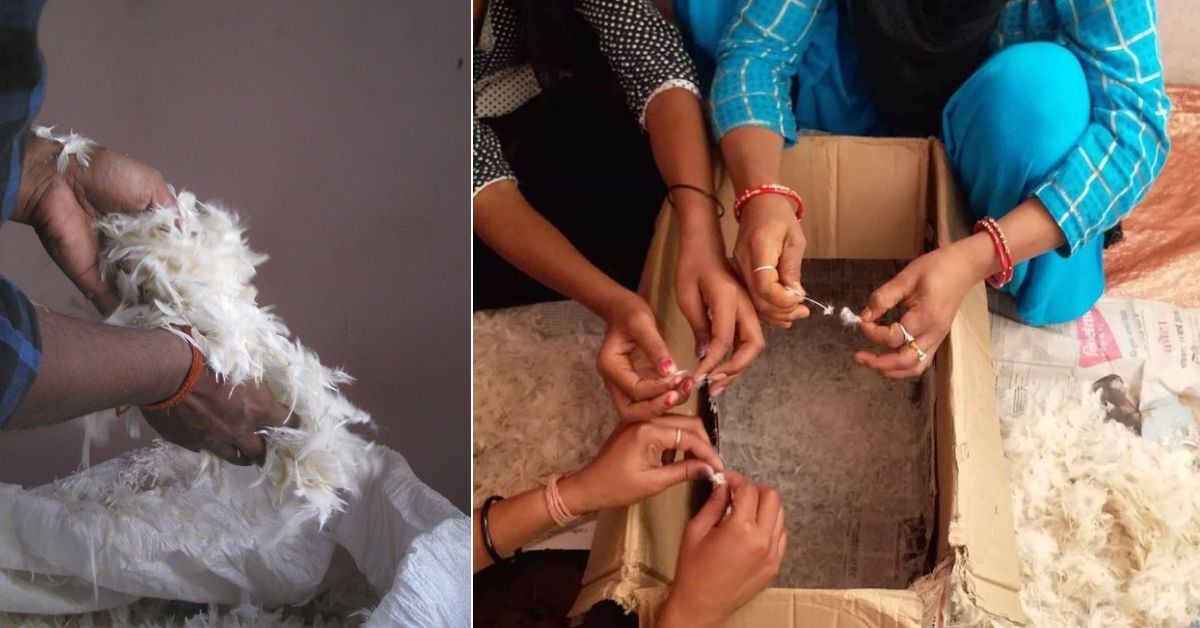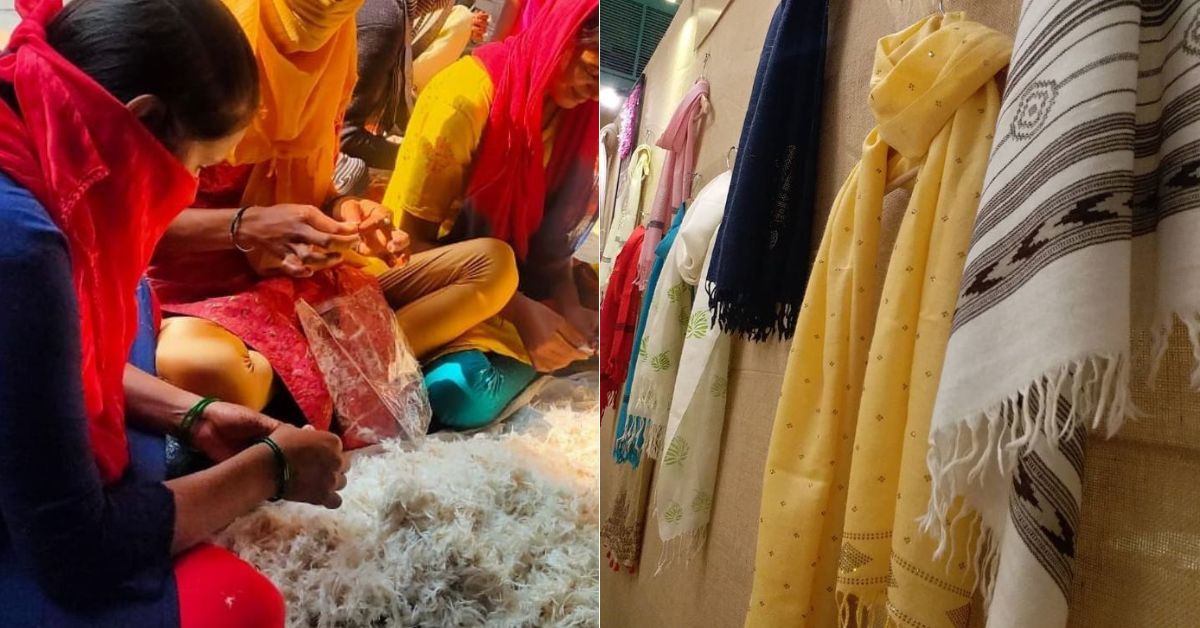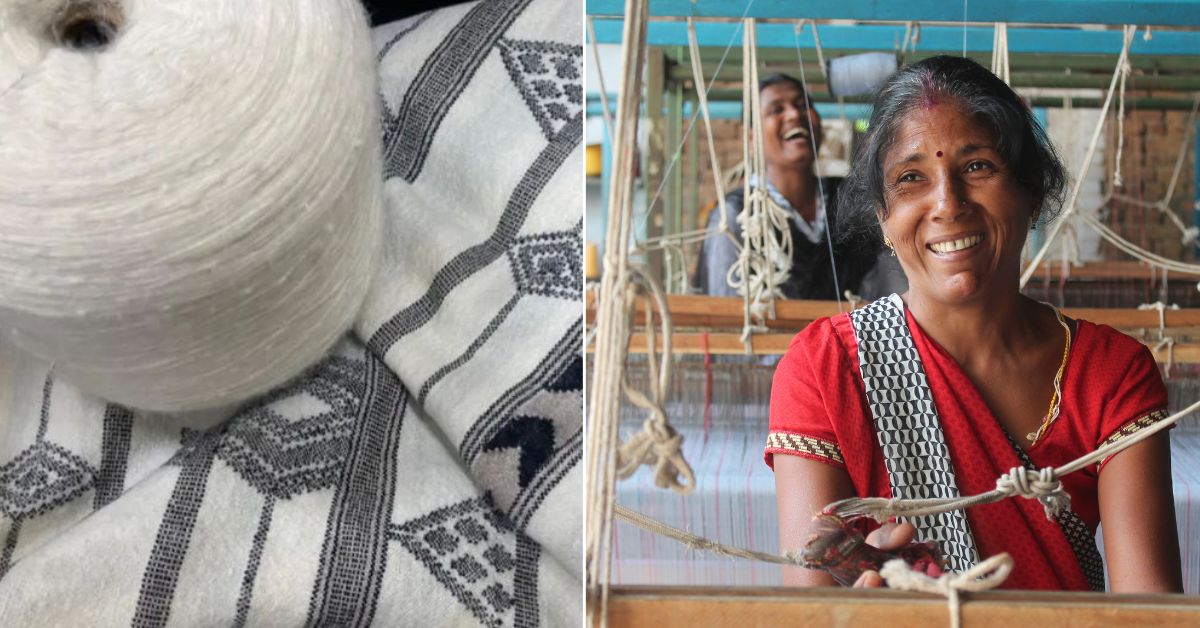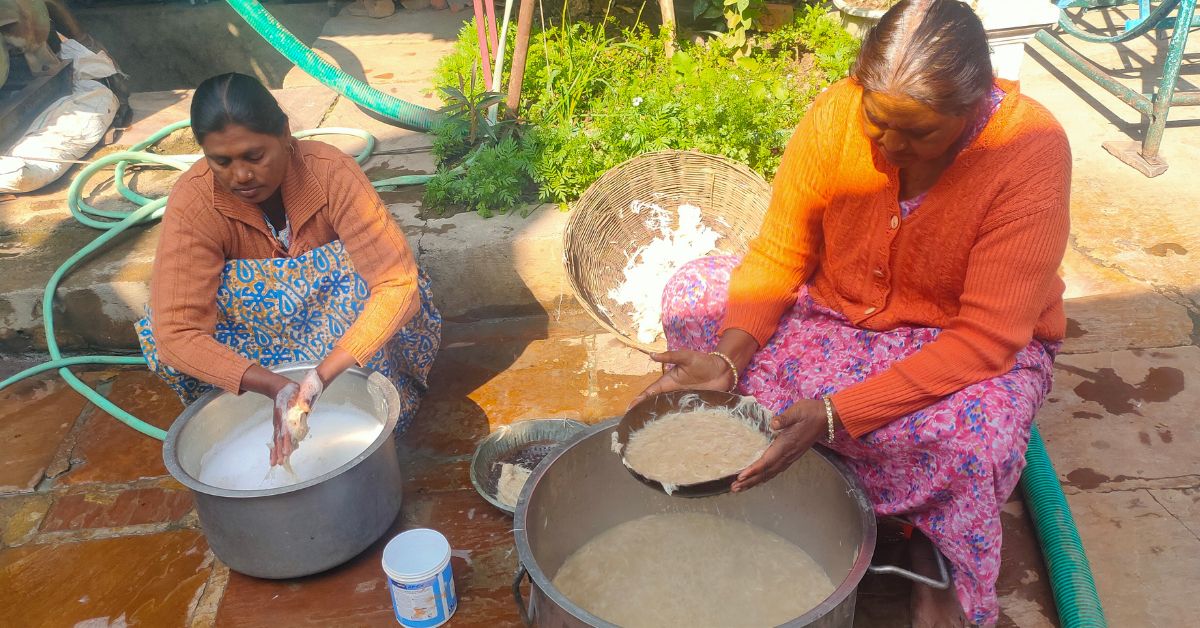Studying at the prestigious Indian Institute of Crafts and Design in Jaipur, Radhesh Agrahari once went to his class carrying a small bag.
But when he opened the bag, he was thrown out of the class.
But what led to this?
“While I was studying, I took up a three-day job in Agra to manage my higher studies. I was supposed to attend a class on Monday in which we were asked to pick various kinds of waste materials or products for research. But I could reach Jaipur only a day later,” he says.
“By then, my classmates had already picked their topics ranging from plastic and sanitary napkins to thermocol. I was hardly left with anything,” he tells The Better India.
A clueless Radhesh was asked to leave the class.
Upset with this, he craved a chicken dish to uplift his mood and went to the butcher’s to purchase some. “I asked him to pack 1 kg of chicken but the packet weighed only 650 gram, while he charged me for a kilo. He said the remaining 350 gram was waste. I then asked him to pack that separately as well,” he adds.
The next day, he took this very bag to his college, leaving the class disgusted. “When I opened the bag, some people puked as it stunk. I was thrown out of the class again,” he laughs.

While his peers abandoned him, the faculty was impressed and asked him to come up with various ideas to tackle the chicken butchery waste.
And it took him nearly 13 years to find success in this field. “Meanwhile, I worked with many organisations like Tribes India, simultaneously focussing on my research work. It all started with a college project but the more I got into it, I found that there is a lack of data on this waste and people only talk about plastic waste. So I wanted to draw people’s attention to butchery waste,” he says.
Today, Radhesh is the founder of ‘Golden Feathers’, which upcycles chicken butchery waste into a ‘wool-like’ fibre and handmade paper. Using this waste as raw material, the startup manufactures shawls, quilts, stoles, diaries, fish feed and manure.
Beyond plastic, waste that needs urgent attention
Coming from a family of doctors in Fatehpur of Uttar Pradesh, Radhesh was expected to join the medical field. “But I was always interested in design and craft,” he adds.
So, he went on to pursue graduation in textile design from the Northern India Institute of Fashion Technology (NIIFT), Mohali, and later joined the Indian Institute of Craft, Jaipur.
“Usually, the students who come to study in these colleges are from affluent and superior backgrounds. They would come to learn about design and fashion. My thoughts didn’t align with that and I was nothing like them,” he shares.

“As I worked all day handling butchery waste for my research, I used to stink as well. People would not stand near me and I felt excluded,” he adds. Nevertheless, Radhesh engrossed himself in his research work, and it was then that he understood the gravity of the issue.
“Chicken butchery waste is the third largest wet waste problem worldwide. It is one of the major causes of river pollution. There is a lack of data on this waste but we estimate that about 32.17 percent of total waste in rivers like Ganga and Yamuna is butchery waste,” he claims.
A report by the Centre for Environment Education (CEE) mentions that India is the fifth largest broiler meat-producing country after the USA, European Union, Brazil, and China, with over 4.6 million metric tonnes of annual production.
Supported by the Ministry of Environment Forest and Climate Change, CEE is a national institute dedicated to enhancing public awareness about the environment. It also states that “poultry waste needs urgent attention as a formal management does not exist for this waste.”
The report estimated that the generation of poultry waste is approximately 20 tonnes per day, just within the city of Ahmedabad. “It [poultry waste] is either sold to middlemen (for processing some body parts into fish feed, manure etc) or disposed of in municipal dumping sites without any treatment, which is against the law and is causing issues related to environmental pollution,” it notes.

Radhesh remarks that in a country where rivers are worshipped as mothers, the butchery waste comprising intestines, blood, skin, inner cells, and feathers, ends up polluting river bodies, which also spreads communicable diseases.
“Waste from big bovine animals is used to make leather, pet foods, and more, whereas chicken butchery waste is either incinerated or ends up in landfills and water bodies. The incineration process releases huge amounts of carbon emissions,” he adds.
“Today, the entire world is working towards plastic recycling, but not many are talking about chicken butchery waste. However, instead of making slogans to clean water bodies, we really need to work on grassroots to solve the root causes,” he adds.
Making shawls, quilts, and paper from chicken waste
In order to do his bit, Radhesh launched his company in 2019. Explaining its functioning, he says, “Firstly, we collect waste from slaughterhouses and then we sterilise and sanitise it in a hygienic way using 100 degrees steam process to kill the various worms present in the waste. Using our patented technology, we use natural ingredients to process the waste into wool-like fibre which is similar to pashmina,” he says.
“Chicken is a fowl and it has feathers similar to other birds. Feathers themselves are lightweight and using that, we are able to make natural wool-like fibre similar to cotton, jute, wool, and silk. This woollen fibre is soft, warm and durable,” he adds.
For this purpose, Radhesh says he has trained 1,200 tribal women of Rajasthan who weave and spin the waste into fibre. Feathers which are not good for spinning are used to make handmade paper or converted into fillers for quilts, jackets, and pillows. In this process, the byproduct of chicken butchery waste is converted into compost and fish feed.

The company units are established in Jaipur and Pune. According to him, they sell the products in B2B business, generating an annual revenue of Rs 1.5 crore. So far, the startup has claimed to have diverted 73 lakh kg of chicken butchery waste from polluting the environment.
For his work, Radhesh has received at least 25 national and international level awards, including The German Design Award, Lexus Design Award, and Swachhata Startup Award.
“Personally, the journey from being a designer to an innovator has been extremely fulfilling for me. I always strived to do impact-driven work and received many awards and recognition for it. We are working at a small level but wish to expand this pan India,” he shares.
“More than anything, we require the Government’s support to further our work to establish a sustainable recycling model, which will help us divert this waste at a large scale. If they can also fund training programmes for women workers and design policies that ensure the waste is not thrown in water bodies or landfills, that will help us further the cause,” he adds.
Edited by Padmashree Pande; All photos: Golden Feathers.
No comments:
Post a Comment